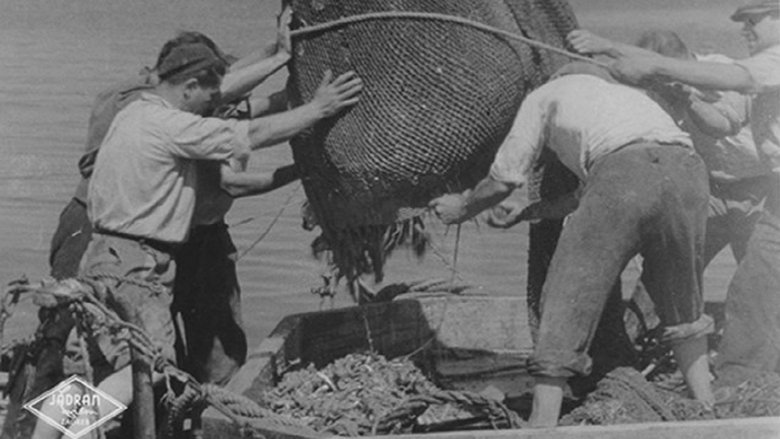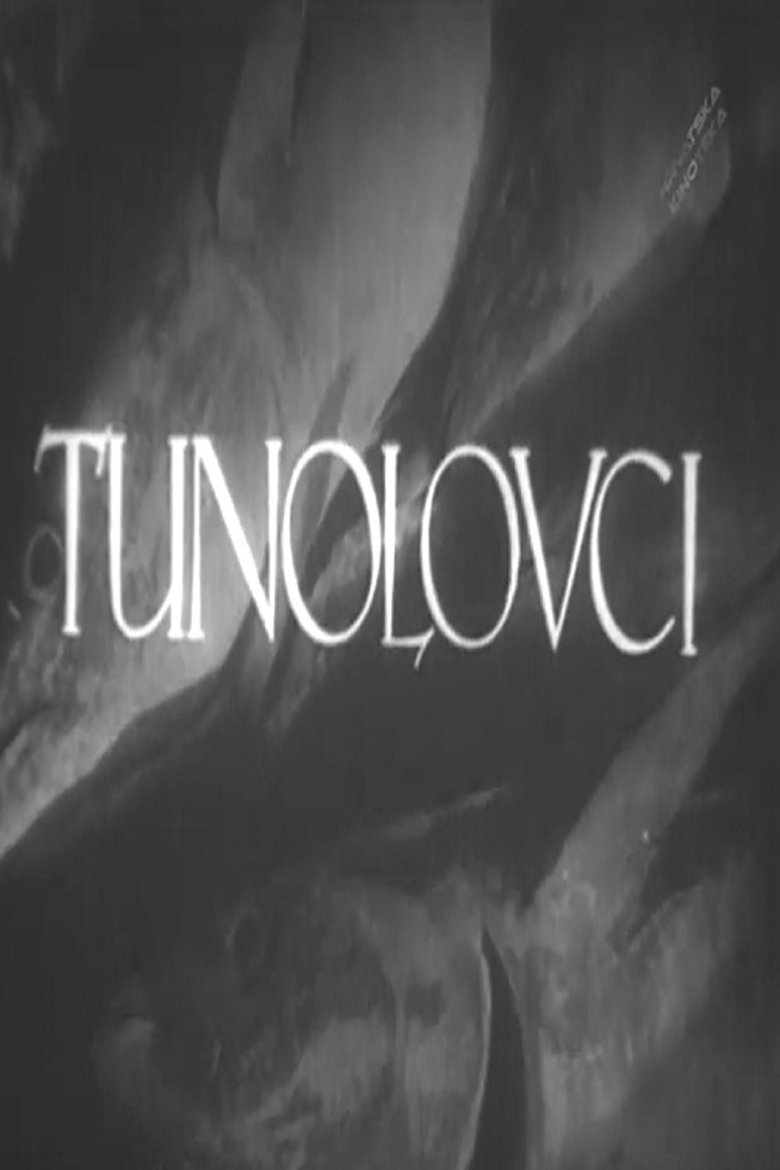Loading


Tuna Fishermen
Genres
Documentary
Overview
Film director Branko Belan follows the journey of fishermen as they set out to catch tuna around the Velebit Channel.
Details
Budget
$0
Revenue
$0
Runtime
15 min
Release Date
1948-12-23
Status
Released
Original Language
Vote Count
1
Vote Average
8
Cast
Meet the talented actors who bring the movie to life.
Branko Belan
narrator (uncredited)
Similar Movies
Explore movies similar to this one that you might also enjoy.
0.0
Fish or Cut Bait
In the 1970's, filmmakers Tom Burger, Bill McKiggan and Chuck Lapp began documenting the history and current struggles of inshore fishermen in Atlantic Canada to form a union. Until 1979 it was illegal for fishermen to form a union in Nova Scotia. The committed funding from the National Film Board was withdrawn for this film, however the filmmakers continued to edit the film by entering the NFB at night. The CBC refused to broadcast the film, but it was finally released in 1990 and broadcast nationally that year on Vision TV.
1993-01-01 | en
0.0
Taking Stock
It was a way of life. It was the backbone of a society. And then the cod fishery off the east coast of Newfoundland collapsed. Taking Stock traces the history leading up to the crisis and the calling for a moratorium of the northwest Atlantic cod fishery. It presents the key players in this complex and tragic story, focusing on those who are now trying to come to grips with an uncertain future. How did the calamity happen? What signals did we ignore? Did we chose the right model in setting up an industry? Ultimately, Taking Stock holds a message for the Canadian as well as the global community: In trying to attain economic success, we must recognize that there are limits to how far we can exploit nature's delicate ecosystems.
1994-01-01 | en
6.0
El don del mar
First short film by director Jorge Grau, about tuna fishing, with a look somewhere between tourism and anthropology.
1957-01-01 | es
0.0
City of Splendour
A documentary about punk and subculture scene of Pula, Croatia from 1978 to 1991, the city that gave birth to one of the most vivid punk and alternative rock scenes in former Yugoslavia, despite having population of just over 60,000 residents.
2013-01-25 | hr
0.0
The Long Road Through Balkan History
Bosnian Croat writer Miljenko Jergović and Serbian writer Marko Vidojković replace one another by the steering wheel of Yugo, a symbol of their common past while driving on the Brotherhood and Unity Highway that stretched across five of six republics of Yugoslavia.
2009-01-01 | en
0.0
Tuna: A Fish with a Special Place in My Heart
The director explains his love for tuna meat which was in his family for generations.
2012-01-01 | en
7.0
About the Art of Love or a Film with 14441 Frames
Godina was ordered to make a short film glorifying the army, but instead made a film about making love, not war. The censors hacked it up, but he managed to save one complete copy.
1972-02-14 | sh
10.0
Lost Button
A documentary about Goran Ivandic 'Ipe', the drummer of most popular Yugoslav rock band of all time, Sarajevo-based "Bijelo dugme" (White Button). Ivandic's fatal jump from the balcony of hotel Metropol in Belgrade in 1994 sparked much controversy around his fate.
2015-01-01 | hr
0.0
Squid Jigging Fishing Boat
Every December to January, almost a hundred squid fishing boats from Ch'ien-chen Fishing Harbor in Kaohsiung will sail from East 120 to West 60 to work at Falkland Islands in the South West Atlantic. The sailing takes 35-40 days and crew members named it "waterway." January 1st, 2015, a 65 meter long, 11 meter wide fishing boat began its journey to Falkland island. This is a documentary about 60 crew members from south-east Asia to work far away from Taiwan.
2017-10-29 | zh
7.2
When My Knife Strikes You
Shot in various villages throughout Yugoslavia, this is a disturbing document of a time when people were stabbing each other with knives without any real reason. Murderers, people who witness these murders and the families of victims all talk about the senseless violence and the human condition.
1968-01-01 | sh
8.0
The Other Side of Everything
For Serbian filmmaker Mila Turajlic, a locked door in her mother's apartment in Belgrade provides the gateway to both her remarkable family history and her country's tumultuous political inheritance.
2017-09-11 | sr
0.0
Shark vs. Tuna
A clash of true oceanic titans sees fights in the remote battlefields of Ascension Island. Tuna are often faster, fitter and bigger than the sharks.
2018-07-16 | en
6.3
Yugoslavia: How Ideology Moved Our Collective Body
A research-based essay film, but also a very personal perspective on the history of socialist Yugoslavia, its dramatic end, and its recent transformation into a few democratic nation states.
2013-04-01 | sr
7.1
Cinema Komunisto
This eye-opening and bittersweet chronicle of the Yugoslavian film industry recounts how the cinema was used—often with direct intervention from President Josip Broz Tito—to create and recreate the young nation’s history, replete with heroes and myths that didn’t always hew closely to reality.
2010-01-29 | sr
0.0
The Forest
In 1947, Yugoslav President Josip Broz Tito visited, for the first time, Romania. Its communist regime gave him, as present, a painting from a great Romanian artist Ion Andeescu: 'The Leafless Forest'. In the 60s, a young art critic, Radu Bogdan, decided to elaborate a monograph dedicated to the great painter, including reproduction of the painting given to Tito. After countless problems, he obtained the permission to photograph the painting. The moment they took the painting off the wall, they found - a microphone. Somebody was spying on Tito...
2014-05-01 | ro
7.3
Once Brothers
Drazen Petrovic and Vlade Divac were two friends who grew up together sharing the common bond of basketball. Together, they lifted the Yugoslavian National team to unimaginable heights. After conquering Europe, they both went to USA where they became the first two foreign players to attain NBA stardom. But with the fall of the Soviet Union on Christmas Day 1991, Yugoslavia split up. A war broke out between Petrovic's Croatia and Divac's Serbia. Long buried ethnic tensions surfaced. And these two men, once brothers, were now on opposite sides of a deadly civil war. As Petrovic and Divac continued to face each other on the basketball courts of the NBA, no words passed between the two. Then, on the fateful night of June 7, 1993, Drazen Petrovic was killed in an auto accident. This film will tell the gripping tale of these men, how circumstances beyond their control tore them apart, and whether Divac has ever come to terms with the death of a friend before they had a chance to reconcile.
2010-10-12 | en
7.0
Trapped Time
Petar Peca Popović is one of the greatest, most famous, most authoritative and for sure, the best, connoisseur of Rock and Roll in the former Yugoslavia. He promoted Rock and Roll in those heroic times. We are going on a peculiar kind of trip with him, along an "emotional homeland", of ex-Yu, "searching for the lost times" and dear friends, the most significant representatives of this culture - rock'n'roll legends.
2017-11-06 | sr
0.0
Chileans
The story of the Yugoslavian football team who became youth world champions in Chile, 1987.
2017-10-18 | sr
7.1
The Great Ecstasy of Woodcarver Steiner
A study of the psychology of a champion ski-flyer, whose full-time occupation is carpentry.
1974-01-01 | de
8.0
Le peuple du requin et moi
2023-10-10 | fr